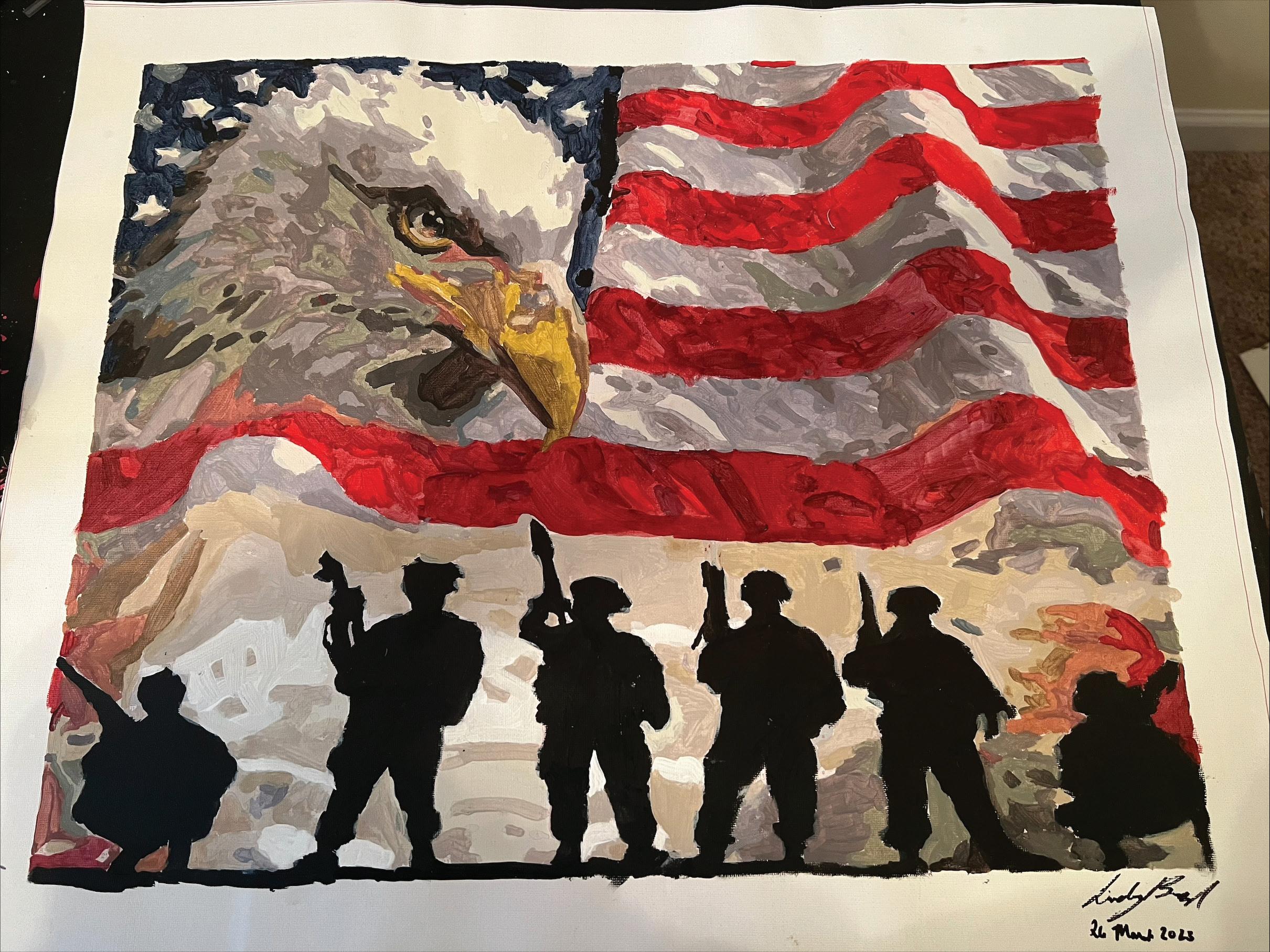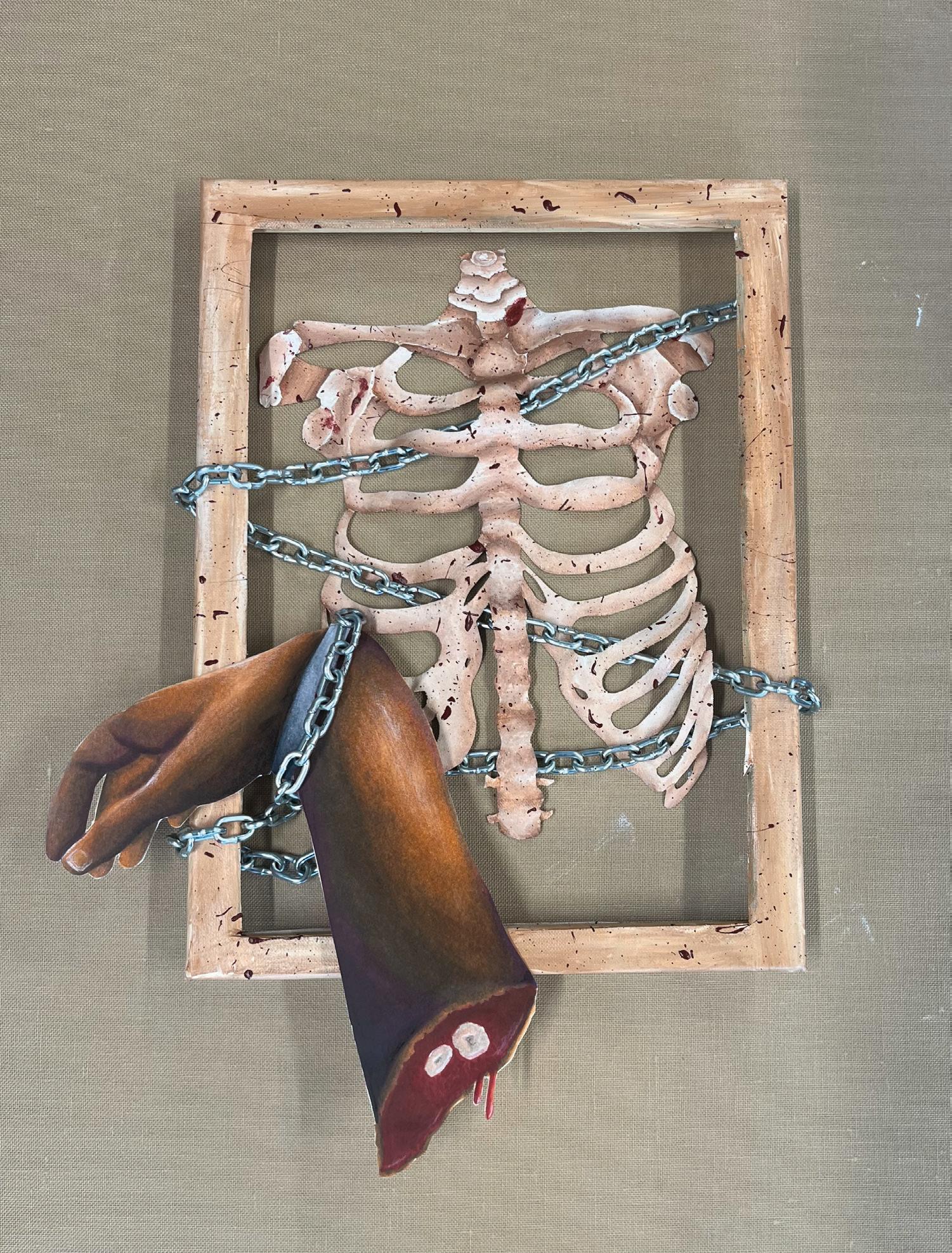




Katherine Garcia, Associate of Arts
This collection contains the creative works of individual authors and artists. The opinions and perspectives expressed within these works are those of the authors and artists alone and do not necessarily reflect the views or policies of the college, its administration, faculty or staff. While the college supports the freedom of artistic expression and the sharing of diverse viewpoints, it does not endorse or assume responsibility for the content presented in this publication.
Welcome to Expressions 2025, the fourth edition of TCL’s literary and creative journal, that not only includes poems, essays, and short stories, but also photographs, paintings, an animated series, and other works of art from TCL students, staff, and faculty.
Thanks so much to all of those who shared their talents and creativity! Thanks, also, to Leigh Copeland and her Marketing Team, Mark Rand and Mindy Lucas, for first promoting and then putting together and editing this publication!
Hope you enjoy!
Dan Herrin & Russell Keevy Editors

All my fear, all my sorrow, All my rage, in which I wallow, Everything that makes me hollow, I hope to say goodbye tomorrow But in this prison, I’ll never leave, Stuck with a monster that I conceived, Will I ever make peace with me? Or am I trapped eternally? Still growing out of control, The darkness becoming a black hole, All darker than charcoal, From actions that I condoned Ever still, oh so pale, All my efforts, to no avail, I should have left, but that ship has sailed, To the darkness, we all hail


Sunny-Lee Alsobrook, Associate of Arts and Science/BCSD Tides Student
Picture this. (Or, maybe you don’t need to picture it because you’ve lived through it.) It’s 11:50pm on the night that your final English essay—worth twenty percent of your grade—is due, and you’ve got nothing, but a single word typed on your document—the title. (Which you didn’t even write—it’s the name of the assignment.) You anxiously glance over at the clock with your bloodshot eyes; and catch sight of the dreaded, beaming red numbers that make you jump every time they change like a ticking-time-bomb. It’s 11:55 now. Long story short, you’re EXHAUSTED and are completely out of hope. As you helplessly watch the time tick down, mockingly counting the seconds before your life ends, you suddenly wish you hadn’t pushed it off and procrastinated for three months. You think to yourself—wouldn’t it be wonderful if you just had a way out? Something with no consequences? Something quick—something easy. In a desperate, last-ditch effort to turn something in, your hand fumbles its way onto the keyboard and types in two letters, followed by two, dreaded words: AI ESSAY GENERATOR. (Or, probably just ChatGBT. Let me have my dramatic moment, thanks.)
Credit where credit is due, the motivation behind using AI to write papers is entirely understandable (if that beginning bit wasn’t any indication.) For context, (if you’ve been living under a rock) websites such as ChatGBT utilize AI to generate all kinds of things, essays included, based on a simple prompt provided by the user. I should mention that I am aware AI can be used for many other, life-changing purposes. I am strictly focusing on the essay-writing use of AI, in the case of a cheating student in school. Like every other student living in the modern era, I’ve been gifted with the displeasure of constantly hearing about AI, or artificial intelligence in my daily life—and with it being so publicized, the temptation is understandable! I think most of us have wanted a way out of writing a long paper—and I say most of us because I could not be
bothered to write something less than three paragraphs to answer a simple readingcomprehension question—and the thought of cheating has probably crossed all our minds at least once. So that begs the question—why not go through with it? Before the time of AI, there wasn’t a reliable way to get a good, work free essay without directly copying off someone—a method that was easily noticeable by teachers. Aside from the obvious integrity factor of the situation, most people probably wouldn’t cheat due to limited options, and not having such an open, tempting method to cheat. (Wow, it’s almost like that’s EXACTLY what AI is.) With AI being so publicly advertised as a work-free essay factory, it’s no surprise people would use it—think back to my example in the beginning. Now, why is this a bad thing? If AI is writing people’s essays for them, and therefore saving them a bunch of work and mental distress, shouldn’t that be a good thing? Short answer: NO. Long answer: sure, it DOES help people in the short term, but that doesn’t mean it’s helping in the long term. Think of it like a parent always doing their kid’s chores for them throughout their life. Then, once that kid gets older and moves out, they’re surprised when they suddenly have to do their own chores. To any other person the kid would just seem extremely lazy, but it isn’t their fault—it’s simply what they grew used to during the most important learning years of their life. Compare that to a kid who’s gradually gotten more chores and responsibilities as they got older. Moving out wouldn’t be hard for them at all— they’re used to the responsibilities. That’s what I believe is going on with AI—if kids keep relying on AI and other technology to write their essays, they won’t develop the skills needed to write papers on their own, essentially becoming unintelligible (Stover 1). You probably noticed the title of this paper—affirming inefficiencies is my way of saying AI, and other technology is helping humans become dumber and lazier— therefore AFFIRMING or encouraging the development of INEFFICIENCIES in humans. As someone who’s grown up with the assistance of technology for my writing, (strictly NOT AI) I do want to mention a simpler example of technology hindering my development as a writer by none other than AUTOCORRECT.
Despite my many conscious attempts at learning how to spell certain words, there are a few—such as conscious (see what I did there?) and psychology to name a couple— that I only recently have begun to be able to spell properly without autocorrect. I fear that I, too, am growing too reliant on these tools, and it’s hindering my writing. Writing is one of the, if not THE most valued forms of communication— not just on paper, but in speech as well—not having that skill is like a language barrier. It also defeats the point of school entirely—the point is to prepare children for work and let them develop the writing skills and study habits to become productive, organized individuals. If an AI is doing that for them, then what’s the point?
Now, I do want to mention that AI can be a handy tool when used without an over-reliance on it. The name “Artificial Intelligence” seems to suggest we are dealing with a smart machine, but in reality, it’s just spitting out patterns. (Remember Affirming Inefficiencies? Seems more accurate to me than putting INTELLIGENCE in the name...I vote false advertising.) Using AI with this perspective—that it is not intelligent like humans are intelligent; that it’s just spitting out patterns—helps people get the most out of AI without completely relying on it (Comola 3). This is clear through the use of grammar checkers and other programs that don’t write the essay FOR you but simply check the essay YOU wrote for small errors. With this in mind, AI can prove to be a useful tool (which I still have never used, but from my friends I know it helps) without the over-reliance part mentioned prior. This method of using AI is the only way I can learn to possibly coexist with its presence, and that alone is a VERY hard stretch for me—someone who has a zero-tolerance attitude for laziness.
Then there is the issue of detecting AI usage. Text generated by AI tools has increased in quality significantly in the past few years—to the point where it is hard to distinguish from text written by a human (Baquero 1). Yijun Zhao stresses that, despite many tools being made to combat AI usage, a universally effective method of detection is yet to be created (2). Now, despite what I just mentioned about AI being able to replicate human writing, a fair bit of errors can still slip in,
along with “hallucinations,” which basically just means it makes crap up (Stover 2). It can cite and pull information from a source that doesn’t exist or plagiarize information without citing a source at all. But that’s a more serious example of the problems of AI—how about a lighter one? A better example of this is in AI’s tragic attempt at poetry, which is as heart stirring as you’d expect, coming from a machine with no heart. Matt Reynolds suggests that AI poetry is “all surface and no subtext...AI doesn’t deal in ideas, it just puts one word after another” (7)
That takes me to my final point. While I know this essay is about AI writing, I have to mention the absolute mockery of artistry and humanity that is AI generated artwork. I once told a man I hoped to be a graphic designer when I grew up, and you know what he told me? That everything I stood for was useless, because my work, and my field—the field I have a kind of passion for that words can’t explain, the field that I’ve spent over half my life loving, and adoring; the field that has literally saved lives, and certainly substantially improved others, (including my own)—would be replaced by AI. If ANY jobs are going to be replaced by AI, it certainly won’t be anything in the art field. Because you can’t truly be creative, if your template is what’s already been written. And the only thing that fuels art is the creativity of the extraordinary human mind.
Baquero, Carlos. “Is Having AI Generate Text Cheating?” Communications of the ACM, vol. 65, no. 12, Dec. 2022, pp. 6–7. EBSCOhost, https://doi.org/10.1145/3565976. Comola, Jessica. “AI as a ‘Paintbrush of Possibility’: Stanford Researcher Victor Lee Delves into AI in Education--the Good, the Bad, and the Possibilities on the Horizon.” Educational Leadership, vol. 82, no. 3, Nov. 2024, pp. 16–20. EBSCOhost, search.ebscohost.com/login. aspx?direct=true&AuthType=shib&db=a9h&AN=180720448&site=ehost-live.
Reynolds, Matt. “AI Poetry Is so Bad It Could Be Human.” New Scientist, vol. 235, no. 3134, July 2017, p. 14. EBSCOhost, https://doi.org/10.1016/S0262-4079(17)31357-X. Stover, Dawn. “Will AI Make Us Crazy?” Bulletin of the Atomic Scientists, vol. 79, no. 5, Sept. 2023, pp. 299–303. EBSCOhost, https://doi.org/10.1080/00963402.2023.2245247.
Zhao, Yijun, et al. “Admissions in the Age of AI: Detecting AI-Generated Application Materials in Higher Education.” Scientific Reports, vol. 14, no. 1, Nov. 2024, pp. 1–13. EBSCOhost, https://doi.org/10.1038/s41598-024-77847-z.

Leslie Harper Worthington, Director of Institutional Effectiveness
Fallen Trees lie rotting on the forest floor
Victims of violent Winds. Decomposing, mistaken for dead. Yet from the dying wood, fresh life springs. Giving sustenance to the dirt beneath, feeding beetles and wasps, providing shelter for the deer mouse who builds her nursery, and the treefrog who takes cover from the sun. Renewing the balance. Sustaining the cycle. How could we ever suppose “the dead tree gives no shelter”?


Ann Cullen, Executive Administrative Assistant, President’s Office
Kaley M. Claffy, BCSD Tides Student
Introverts and extroverts are highly contrasting personalities, even with some unexpected differences. Introverts are typically seen as people who like isolation and spend their free time alone, like reading a book or creating art. Extroverts, on the other hand, tend to be seen as extremely outgoing people who like to be social and go to parties. Naturally, these basic ideas can lead to some misconceptions, although there are many people who do not mis-conceptualize them. Overall, there are many differences between introverts and extroverts, although they can still coexist smoothly. Introverts, unlike extroverts, do not tend to experience high levels of social energy or a boost in mood after social interactions. Surprisingly, however, they did not fare too well with the isolation caused by quarantine. “Equally, introverts who had greeted lockdown with a certain amount of glee may have soon discovered that being locked in with housemates or family hardly delivered the solitude they’d been looking forward to” (Ku 11). This quote explains how introverts did not get the solitude they expected and wanted during the quarantine, which may have led to an even worse experience than before due to the lost hope. This can be further supported by: “Indeed, recent studies have found that introversion was predictive of more severe loneliness, anxiety and depression after the circumstantial changes brought about by the pandemic” (Ku 6). Based on this quote, we know that introverts had much more negative moods during the pandemic. So, introverts did not enjoy the isolation as much as the general population would expect. Before and after the pandemic, introverts attended in-person classes, although they may learn differently, especially in terms of active learning or passive learning
lectures, from extroverts. “Introverted individuals who attended the active learning sessions did worse on average than introverts who received the passive lecture alternative…” (Beckerson 54). What this quote means is that introverts perform better in passive lectures, which may differ from other classmates’ results. On a similar note, where a person does their work can also affect the quality. “However, companies overlook the fact that some employees—most of them introverts— produce better work when sitting within the four walls of a room or a private cubicle” (Joosr 9). This quote explains how introverts perform better in private areas rather than public ones, which most employers may overlook. However, if the supervisors provide adequate learning and working materials to both types of individuals, then both introverts and extroverts can coexist in those environments.
Extroverts, unlike introverts, do tend to have high social energy and get a boost in mood after social interactions. During the pandemic, many people expected extroverts to live terribly. However, “As the pandemic unfolded, even extroverts who lived alone may have found communication apps like Zoom, Houseparty and Clubhouse adequate in maintaining their social lives.” (Ku 10). So, extroverts still got the social bits of life to enjoy, even though it was not as physical. When introverts got a lot of negative moods during the pandemic, extroverts did not.
“Extroversion, meanwhile, was correlated with lower levels of anxiety and a lower likelihood of experiencing mental health issues during lockdown” (Ku 6). Extroverts, instead of an increase, had much lower levels of negative moods. In the classroom, introverts perform better with passive lectures. However, “…the opposite trend was observed in extroverted individuals, demonstrating that extroverts who attended the active learning session performed better on active learning– specific exam questions compared with extroverts who received the passive lecture alternative”
(Beckerson 54). Unlike introverts, extroverts perform better with active lectures. Also, unlike introverts, extroverts preferred open areas to work instead of private ones. “However, companies overlook the fact that some employees—most of them introverts—produce better work when sitting within the four walls of a room or a private cubicle” (Joosr 9). Using the inverse of this phrase, this means that extroverts do not prefer private spaces, but rather, open ones, and perform better there. Both introverts and extroverts experience situations differently, but that does not mean they can’t get along. “As the pandemic progressed, introverts experienced increases in stress, while more extrovert students reported slight decreases in stress” (Ku 7). According to this, the stress of introverts goes up and the stress of extroverts go down, which is unexpected based on the theories of people beforehand. “Interestingly, the trend was reversed for positive mood: extroverts tended to experience a decline in mood during the early pandemic period, while introverts experienced a slightly improved mood” (Ku 8). Based on these two quotes, introverts’ moods started out strong, but decreased over time, and extroverts’ moods started out weak, and strengthened over time. In terms of both of their learning methods, “On the aggregate level, research has consistently suggested that active learning improves student performance” (Beckerson 48). Although the specifics of this data differ from personality type, overall, teaching with mainly active lectures improves the students’ scores more as a group. Both introverts and extroverts can do better work “By forming teams consisting of a healthy mix of introverts and extroverts and providing the flexibility to move between group-oriented and private work, companies and businesses can create an equitable environment in which different personality types can shine” (Joosr 9). If the employers provide a healthy work environment in which everyone can succeed, then employees will do better work and be happier about it.
It is often believed that introverts cannot do well when they’re center stage, however “When introverts have time to process and rehearse what they want to communicate, they can be as equally captivating as any extrovert” (Finkle 73). In other words, if you give an introvert time to prepare for being center stage, then they will be able to handle it. Overall, by making up for both personality types, then both can succeed. As much as introverts and extroverts differ, they can make a good duo in any situation, if they are provided with what they need to do so. Introverts, although they perform better in private spaces and passive lectures, did not perform well in the isolation caused by the pandemic. Extroverts, although they perform better in open spaces and active lectures, did, in fact, perform well during quarantine. No matter how different these two personalities can be, with the right set up, they can perform well anywhere. So, in conclusion, even if introverts and extroverts are different, they can manage just as well as the other with the right environment.
Beckerson, William C., et al. “An Introvert’s Perspective: Analyzing the Impact of Active Learning on Multiple Levels of Class Social Personalities in an Upper-Level Biology Course.” Journal of College Science Teaching, vol. 49, no. 3, Jan. 2020, pp. 47–57. Education Full Text, https://doi.org/10.2505/4/jcst20_049_03_47.
Finkle, Jane “From Behind the Curtain to Center Stage.” TD: Talent Development, vol. 73, no. 6, June 2019, pp. 72–74. Academic Search Complete.
Joosr. A Joosr Guide To: Quiet by Susan Cain: The Power of Introverts in a World That Can’t Stop Talking. Joosr, 2015. EBSCO Ebook Collection.
Ku, Lis. “Have Introverts Really Fared Better in Lockdown?” The Conversation: An Independent Source of Analysis from Academic Researchers, edited by Conversation, The Conversation, 2018. Credo Reference.

Jo Little, Library Specialist
Will You Remember Me?
Will you remember me when I’m gone? Will you long for me, cry for me, Love me, the way I will for you? Leaving you behind, In the place I was born, With my favorite smells, The creaky stairs, The leaky roof I didn’t repair. The trees I used to climb, Leaving it all behind. Flowered curtains blowing in the breeze, Fiery sunsets by the sea. Rooster cries, Donkey rides. I want to take you away, Far away to a place, Where there are no dead bodies, Sounds of war, Burning buildings, Screaming women, Crimson rivers, Death beneath my feet. One day, I will return for you, Hunt you, find you, Hold you tight. Will you wait for me?

“Assymboly” Introduction Sequence Sunny-Lee Alsobrook, Associate of Arts and Science/BCSD Tides Student (Click for video)

By Dawn’s
Lindsay Boyd, Health Sciences
By Megan Margaret Carlisle, Webmaster Certificate Program
There are times when it feels like my brain is being eaten by worms and those worms are whispering mean and cruel things to me. They defecate negative self talk and exhale my insecurities until they’ve seeped into the folds of my mind. My average moment in relationship to my brain is feeling like we’re an old married couple bickering over what’s best to do, say, and even think. I am not my brain, my brain is an anxious, depressed, and highly critical amalgamation of all the wonderful and woeful things that have happened to me or that I’ve imagined might happen.
My memory is terrible and I think that’s because the worms that eat my brain hide certain thoughts, memories, and experiences from me. Not all of them are helpful to lose access to, but there are those memories I’m probably fine with having forgotten that I’ve even forgotten them. I worry that as I get older I forget more and more of the years behind me. There is more than enough Alzheimer’s and dementia in my family to make this something that I am warranted to be anxious about, unlike most of the rest of my anxious thoughts and negative self talk.
An early memory is standing on the stairs outside of a large old building that, in my head, looks like a government facility like you’d see in DC. I’m standing on those steps and eating one of those cookies that are like the inside of a Nutty Buddy bar, but are slightly softer. I take a bite and a tooth comes out. I hold both the cookie and the tooth while my mom takes a photo. I don’t know why this is my earliest memory or even if this is the memory of mine that’s actually the earliest. I imagine that part of the reason I remember it is because there’s photographic evidence of it and that either jogs the memory or adult me has formulated a memory to fill in the gaps that child me has forgotten.
My great grandfather used to tell a story every time I would see him, multiple times a visit. He would talk of visiting a petting zoo of some sort and an animal, I think it was an emu or a llama, plucks the ribbon from my hair. He told the story so fondly and so often and he’d always ask me, “do you remember that?”
I’d always say “yes, Granddaddy, I remember it.” Even though I have absolutely no first person memory of it. There is no photographic evidence of this event, but I can play the scene like a movie in my head. I’m watching myself be held by my mom or my great grandfather, depending on the context of remembering this moment. I watch as the creature plucks the pink ribbon from my hair and slowly
unravels it and it floats in the breeze. For whatever reason, I’m remembering the ribbon as pink and the creature as an emu as I type this, but if I think of this memory a week from now, will it be blue and the creature a llama?
I’ve had two best friends since sixth grade and they are often my external memory banks. I run things by them and confirm if something actually happened or if I imagined it. Daydreaming is a frequent pastime or coping mechanism of mine and those daydreams can sometimes become memories if they occur often enough. I’ll be sitting with my husband and thinking about something that I want to say to him, like a comment about whatever we’re watching or something that we have to get done that day. I turn to him to say it but stop myself. I ask him, “tell me if I already said this or just thought it and didn’t actually say it out loud”. He always answers and doesn’t make me feel bad about it. Making the present into a memory is not a passive activity for me. I have to actively grab those thoughts, feelings, and mental pictures to go along with the photos and videos in order to make them stick.
I have been diagnosed with anxiety and depression for a few years now, and I was able to add an ADHD diagnosis a year or so ago. These answers to questions that I didn’t even realize I had have been some of the most helpful and harmful things for me. It’s so easy to wash away blame and personal responsibility for thoughts and actions or lack thereof when I can just chalk it up to an anxious thought, depressive episode, or my ADHD. These features of my brain used to be the cheat codes that carried me through life. I was a person who thrived in the ritual, routine, systems, and schedules that school provided and once I got out into the “real world” keeping track of the big and small stuff and making sure I was organized became a more daunting task. I was suddenly the sole figure responsible for that schedule and routine and that was overwhelming. I floated through life jumping from job to job, and feeling like the connection to the world became more and more thin. I finally spoke to a therapist and then a psychiatrist. Getting prescribed an antidepressant and a mood stabilizer have helped immensely to keep me from wallowing in an anxious bubble or withering in a depressive hole. It’s not perfect and those worms that still eat at my brain continue to whisper, but I have tools, a support system, and a better understanding of myself that I didn’t before. Being medicated is one of the best things I’ve ever done for myself and I invite anyone that feels they might need help to seek it.



Meghan Aulabaugh, Associate of Arts
Her hand was never afraid to hold mine.
She turned her caring eye towards the frailest of hearts.’
After the lions had chewed and spit me out, there she was.
A kind whisper away.
To stare straight into a chamber that held a broken soul.
To share a smile, an ear, a tear, a hand. Her hand was never afraid to hold mine.
A mournful, ghostly flesh I withered into. No, she did not mind how cold to the touch my hand was, nor the grief that sat in my lonely eyes.
A friend she was indeed.
How gracious her sweet melody was to champion over my melancholy. Kindness herself breathed a warm and gentle wind into my soul. My pruned heart used its last bit of strength to hold that gust of hope. For my inhale would soon leave me as quickly as it came. Again, her hand was never afraid to hold mine.
The sweet angel knew that with time, with faith, and with love, I would be strong enough to let go of her hand.
Mr. Leslie Corpening, Adjunct Speech Instructor
We can’t go anywhere without the urge to look at our phones to check who knows what. Before cell phones replaced pagers and Facebook supplanted Myspace in the early 2000s, glancing down at a device was unheard of. If we did have a pager, we would wait until we had time to view the number. Even after cell phones replaced pagers a few years later, we still didn’t glance down at our phones because we answered them. After the next revolution in communication came along, texting, things changed drastically. Initially, we resisted the urge to text because it made little sense. “What’s the point of texting when you can just call someone and talk”, was a common refrain. Nevertheless, texting caught on. We slowly but surely began glancing down at our phones to see what message was waiting so we could reply eagerly. Yet, in those early years, texting was an immobile pastime only enjoyed while sitting or standing. Then cell phones and the structure of their service changed. Flip phones made way to phones with keyboard pads which later morphed into touch screen phones. Limited data plans subsequently became obsolete paving the way for unlimited data plans with the emergence of smartphones, which became the preferred method of communication at school, work, and home with a nudge (shove) from cell phone companies. Once they astutely switched from requiring limited data plans to unlimited data plans for smartphones, we were forever duped. Smartphones were more sophisticated because they had more computing power and much better internet access than dumbphones (SMH). They eventually obtained Wi-Fi capabilities and then metastasized into minicomputers because of the information superhighway, better known as the internet, which transported school, work, and home activities into the streets. They “blew up” the way we interacted daily because they enabled us to become mobile consumers. We no longer needed to be in person to shop, bank, or play video games. We began interacting and conducting business wherever and whenever we wanted to, which led us to look down more than ever. Staring down at our phones to receive/send calls, text messages, and emails became the norm. Securing internet connections and painstakingly reading a website’s small print was intoxicating. Thus, the Droop-Neck life, staring down (drooping our heads) into mobile screens anytime and anywhere was born.
From my experience, around 2010 young people made up most DroopNeckers. Society chided them for Droop-Necking. They were abhorred and shunned for constantly using their phones on the move. Alas, those preteen and teenage vagrants had become even worse (LOL). We treated Droop-Neckers like outcasts by slowly rolling our eyes and making faces at them. We tried to intimidate them into walking straight with their heads up daring them to check their phones while on-the-move. The nerve of those young people not watching where they were going. The offense grew when twenty and thirty-yearolds began Droop-Necking too. Yet, trying to intimidate or embarrass them for Droop-Necking just didn’t work because they persisted. Subsequently, in the blink of just a few years, older adults were infected with the urge to DroopNeck as well. Young and old alike were on the streets conducting personal and professional business in real-time. Then parents began giving phones to children as young as seven years old. Consequently, with the development of apps several years later, the malady of Droop-Necking was here to stay.
I remember the day a decade ago when I realized that I too was infected. I was in the mall enjoying a wonderful Saturday afternoon with my wife and kids. Suddenly, an urge to tinkle arose, so I left them in a store to find the restroom. As I hurried through the food court into the restroom area, something told me to look up. To my dismay, I was in the entrance to the Lady’s restroom Droop-Necking all the way! When I shrieked and turned to go the opposite way, I noticed several young Droop-Neckers leaning on an adjacent wall watching my path. When our eyes met, they smiled and chuckled as if to say, “Yeah, you almost made a big mistake OG.” I thank God, the something I premise, for telling me to look up just in time.
Over the years, I’ve seen people Droop-Necking while driving, walking down the street, and even crossing the street. Thankfully, the shrieks from listening to something tell them to look up; the yells from onlookers warning them of imminent danger; and the honks from drivers whizzing by averted innumerable catastrophes. Droop-Necking is a powerful force. The lure of instant transactions, simultaneous interactions, chatbots, Zoom calls, live entertainment, and TikTok is too much to bear. Glaring down into our devices to see the latest fashion trends, video shorts, trending topics, telemarketing annoyances, and text messages is what we do. It’s the Droop-Neck life.


Ann Cullen, Executive Administrative Assistant, President’s Office
Rosemary Hunt, Spanish Instructor
The king tide has pulled back the sea far beyond the usual mark.
As we cross the dunes, a cool wind rushes by. I pull my jacket around me. At the shore we turn north. It is the unspoken rule—head into the wind on the way out. It will be at your back coming home. I find an olive shell, its occupant trying to bury itself in the wet sand. It glows with life. I leave it there.
Far ahead is a purple bank of clouds
To the west the sun still rides low in the sky. It is late into the golden hour. Soon darkness will win out, but for now, we walk in long shadows.
The beach is wide, strewn with shells left by receding waves. Puffs of seafoam glide over sand still glistening with a film of ocean water. Its surface reflects a sky full of clouds ever changing in the light.
When I was a child, I walked barefoot where earth and water mixed. I used my toe to pry half-buried angel wings and conchs from the sand, rejecting any showing a chip or blemish.
But now, I look for the broken shells-the ones cracked open to reveal Fibonacci’s sequence, the pieces of cockles—bright pink and orange, spotted brown. They have been battered by the ocean, but still I know them—bull’s eye, auger, limpet, the pieces of a tulip shell, still retaining narrow stripes of red. I bend down to pick one up.
I hold a broken mussel shell in my hand observing how the outer shell is peeled away revealing mother of pearl.
The sun has set and the sky turns silver grey. The tide has turned. He walks ahead, ready for home. I trail behind.
At water’s edge I find an olive shell. Surf and sand have stripped it of its nacer, But its form is as always. I pick it up, drop it into my pocket, and turn west.


Home
Kiley Caffrey, Culinary Arts Technology
History repeats itself. Eventually, the fingers guiding its spokes and twists grow bored and lack the creativity of human experience. Through time and history, there has been cruelty and injustice. Lynchings, burnings, stonings, beheadings. Is it not fair to assume these repeated “defenses” are carefully selected for the reinforcement of something undeniable? Pressure builds in those who curate the fragile bone and muscle of the space and time continuum. Or is it perhaps pleasure, leading the lives of those on a live wire to endless doom. That must be fair. That must be the solution. A final solution. It is no secret the headlines and media outlets display a certain sense of familiarity, a disorienting sense of “Deja vu”. Yet, the brief lapses in memory and edited education recall times from decades to centuries. A wonder, it is. If only a finger could be placed to identify the reasoning behind the fears of a future not unknown but remembered. How incredible documentation becomes once it no longer faces the threat of being burned. Being terminated. Is that the next step in our looming battles and wars? Surely, one will not be the final. It is the mere beginning.
Gaze upon windows. Follow the shapeless, dull clouds surpassing your lines of vision. Ignore the glaring, the staring, the undeniable yet easily ignored iris located within the sun. Funny, sunburns used to be so utterly painful. Too blaring and molten to be distracted from. It seems sunburns and suntans have become the new
interchangeable. Forget the screens and products that shield the delicate layers of epidermis. Do not let that be the factor in which controls. What is possibly controlling? Red is such a beautiful, manipulative, staining color. The hues seep and run along the delicate linens and strings that tie the world and its divided countries together seamlessly. That is, if you choose to use the admired pigment. Ignore the opposing fragments. Ignore the calming, trepid, gentle blues. Why would it be wise to glide along the threads and ties that truly build the foundations and connections? That is deplorable, if not delusional itself. Paint the blue petals red. The garden could always use a new type of maintenance, anyhow. It helps the flower bed stay nice. Recalling is an enigma, especially in the matters of age and wisdom. Someone who is old, perhaps senile, seems to maintain perfect recollection. The false ideas derived from “wisdom” surely do not exist. They are not befitting for someone of that age group. Leave the ideologies and agendas for deliberation with those who hold experience. With money. The concept is fairly simple. Age is not the defining factor of knowledge or intellect. Somehow, it has been discovered to be the complete and utter opposite. Yet, the wonder of what feels wrong seems to become hazier. Harder to discern amongst the onslaught of overwhelming information. Choose the events that will be repeated. Do not fret or flee once these events of the timeline make themselves apparent. This is what was always desired! Why not celebrate? Why scream in complete horror and shock? Surely, the shouts and cries are mistaken! This is what you wanted. Let us call it a reboot. A dramatization. Surely, the cameras will lose memory. Didn’t you?

Kiley Caffrey, Culinary Arts Technology
People can be hateful. Vicious and beyond the salvation of understanding, It easily buries the original senses of innocence and wonder. How upsetting. Do they perhaps not yearn, or have a forgone sense of forgetting?
The naivety, the utter passion for providing defense and fighting.
Hearts can ache or break, shattering beyond the recognition of bare empathy. The cracks and shards are replaced, filled with a false restoration of apathy.
Do their eyes not water? Replaced by burning, molten streams of antipathy?
A river in drought and doubt would have a stronger sense of sympathy.
Wave to those that may be forgotten, left defenseless and burned in the dust.
That is what it is all about, correct? Climbing the ladders is a must! Is it truly worth the breaking of bones and backs, a result of bloodlust? It has become a wonder to discern what ultimately qualifies for true “disgust”.
I do not beg or plead for the changing of beliefs or values beyond me. That is not my place. My place does not include the allowance to be free.
But is anybody truly? Fulfilling the freedoms they are no longer able to see?
Interesting how the oceans that churn and sway are nothing but unattainable sea.
Let us rewind! Reset the clocks of “society” and economy!
Bring attention to the real reason we all gather and prevent autonomy. Is it money they so desperately crave? The coins and bills creating dichotomy?
Of course, the solution of this “unfounded and crazy” realization is fitting for a lobotomy.
Dictate your spaces and places as you see fit.
Do not fret, I will simply do as I am ordered around to be: Quiet. Do they seriously believe that? That I would replace my kind caress with a hit? It is laughable, witnessing the loss of a mind who lost its wit.
“What radicalized you?”
Kiley Caffrey, Culinary Arts Technology
What defines radicalism?
Is it the drive to create positive change in the world, yet diminishing the foundations of bigotry? No, it is the “advocation of complete political or social reform”. Right?
Perhaps I was... misguided, misdirected. My mistake! Opening my eyes and discovering the hatred, veiled in false promises and shepherd fields. That was my fault. It is my own fault I want to create the change that aligns with my agendas. How else would executive decisions be made?
How interesting, the titles are thrown in my direction. Delusional, snowflake, sensitive.
Ah yes, the beautiful trilogy that defines my “radicalism”. My empathy, my sincerity, my utter passion to help the underdog.
That is too political, surely for a radical. Am I not allowed to share my thoughts and ideas with the crowd? Disagree, agree. Vote on the matter. But do not vote that way, that is not relying on facts! Merely “emotion”
Conform, is that what you are asking demanding of me? Perhaps I will reflect on my appearance. Forgo colored hair and decorated skin, Replace my non-conformity with what is legislated. I always wanted to follow every trend!
Rest assured, while I stand here in my last moments of “indoctrinating” Hold onto your hats. I beg the radicalized, deranged, deplorable question my “side” asks in response to yours. Why wouldn’t I treat others how I want to be treated?


S. Frances Tiger, Continuing Education
Like raindrops in summer, or warm breezes in Spring
It’s like the world has come alive, or maybe that’s just me
Like honey dripping from the comb, the sweetest taste to touch your lips
I sometimes think I’m imagining…that I simply don’t deserve it
Like coming home af-ter a trip, my eyes, they can’t contain it
A whisper that soothes the soul, a fire that a-blazes
My skin breathes with every thought, my mouth becomes a drought I sink into the deep dark sea, no hope of coming out My face, it hurts from smiling, my heart a swell of tides
My head’s a spin of drunkenness, when no space exists at night
I wish, I hope, I dream, I think of what could be How lucky am I, to know that you want me
Just me Just you
The world just fades away We sometimes swim on banks of wonder Miles from…who could say?
A sea of stars, the moon above Who takes the sun and shines And lights the way in the still of night
Our minds intwined in kind
In fact, you can teach an old dog new tricks. Russell Keevy, English Faculty
Nothing in my history suggests that I would be a college English instructor. NOTHING. The message drilled into my head during my formative years was to get a high school diploma so I can get a job and take care of myself. College was never a topic of discussion. In my entire extended family, college was never an expectation. As a male in my family, acceptance by the male elders was gained via work. It didn’t matter what kind of work, it only mattered that one worked. Work equaled respect from the dads, uncles, and grandfathers of the tribe. My younger brother was the first to complete a college degree. He and I are the only two who, out of all the cousins, aunts, and uncles, completed degrees. My brother chose the traditional route. I, however, didn’t start college in earnest until I was 30. Before enrolling in college, I worked. I had many jobs, most in automotive-related areas. The most important thing to know is that my educational journey would never have materialized if I hadn’t met my wife.
I met my wife when I was 28 years old. I was working in a video rental shop, and she rented videos there. In short, that’s where I met her, and we’ve been together ever since. After we met, I got a job managing a local tire and automotive center. I made good money and was good at that job, but I wasn’t crazy about it. I was also beginning to grapple with the idea that I was destined to work these kinds of jobs the rest of my life.
One day, my wife, who had a bachelor’s degree before we met, asked me why I had never gone to college. I didn’t really have an answer; it just didn’t seem like something I could do. She suggested that I should at least give it a try, and if I did decide to be a full-time student, we’d figure out a way to survive. I wasn’t ready
to jump in, and honestly, the idea was scary. I shared my feelings with her about going to college: I was too old, too dumb, and I wasn’t going to be in a situation where a bunch of kids would make me look stupid. She suggested I sign up for a night class at the local community college to see if my fears were justified.
I agreed to this, so I went down to Spokane Community College and signed up for a night class. It was a history class. When I first entered the classroom, I quickly noticed quite a few students my age. That was nice. I took the class, enjoyed it, and got a B. It also became clear that my best path to escape my current employment situation was education. My next move was to decide what degree I should pursue. In other words, what I want to do when I grow up.
I decided to become a full-time student. I enrolled at Spokane Falls Community College to earn an associate in arts degree. This seemed like the best choice; I could acquire credits while exploring my options for a bachelor’s degree. I was a successful student, which gave me the confidence to continue. Over time, I landed on high school English teacher for a career. Once I completed my associate degree, I enrolled in the education program at Eastern Washington University. However, it wasn’t long until I realized that, for a variety of reasons, this wasn’t a good idea. One reason was that I didn’t think I’d have the patience to deal with parents and their wonderful spawn. Nevertheless, I was determined to get a four-year degree, so I decided to get a degree in English. That is what I’m good at and a discipline for which I have a passion. I also realized that just by having a degree, doors would open for me that were closed before.
During my time at Eastern, I got to know some of the faculty and the head of the department. I hate to admit this, but the head of the department, Dr. Elder, and I would often smoke together on the loading dock of the Humanities building. After two years of being smoking buddies, we developed a great
relationship and he became both a friend and mentor. Plus, we came from similar backgrounds and grew up in small towns in Eastern Washington. My relationship with Dr. Elder would have a significant impact on my life. When I was just a few weeks away from finishing my degree, Dr. Elder asked me to come to his office. We got settled in and then he asked me, “So Keevy, what are you going to do now?” I said I was going to start looking for a job. Dr. Elder then asked me a question that would change my life: “Have you considered getting a master’s degree?” I kind of knew what that was because my wife had completed a graduate degree a few years before I started college. I knew a couple of things for sure: a master’s degree is expensive and demanding. I told him it had never crossed my mind, and it was too expensive.
Dr. Elder went on to ease my concerns: “You won’t have to pay tuition. You’ll be a teaching assistant, and we’ll pay you to teach one class a semester. All you pay for are books.” Plus, the English faculty believes you have the knowledge and talent to succeed. He also explained that the department would like me to pursue a Master’s specializing in Rhetoric and Composition. This degree was focused on teaching in two-year colleges. I told Dr. Elder I would get back to him the next day. That evening I told my wife about Dr. Elder’s offer to attend graduate school. She looked at me like I was nuts. Her exact words in response to my news were, “Are you crazy. Hardly anyone gets to go to grad school for free. You need to go see Elder first thing tomorrow and tell him you accept the offer.”
This was a life-changing event for me. I have been teaching college English for over 30 years. Still, when I wake up in the morning, I look forward to going to work. Thirty-five years ago, if you told me this is how my life would turn out, I would have thought you’d lost your mind. I did learn an important lesson: You can teach an old dog new tricks.
TCL Statement of Non-Discrimination: The Technical College of the Lowcountry is committed to a policy of equal opportunity for all qualified applicants for admissions or employment without regard to sex, race/color, religion, national origin, age, disability, service in the uniformed services (as defined by state and federal law), veteran status, political affiliation or belief, marital or family status, pregnancy, childbirth, or related medical conditions, including, but not limited to, lactation, genetic information, genetic identity, gender expression, or sexual orientation. Contact information: Title IX Chief Officer Allison Canning, Vice President for Student Affairs, Building 8, Beaufort Mather Campus, acanning@tcl.edu, 843-525-8210 or Title IX Deputy Officer Tara Lahnen, Executive Director of Human Resources, Building 6, tlahnen@tcl.edu, 843-525-8364.